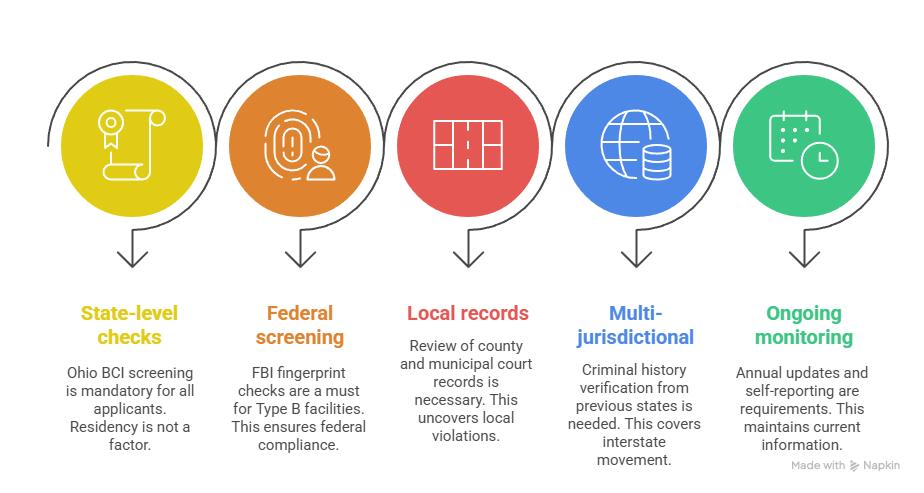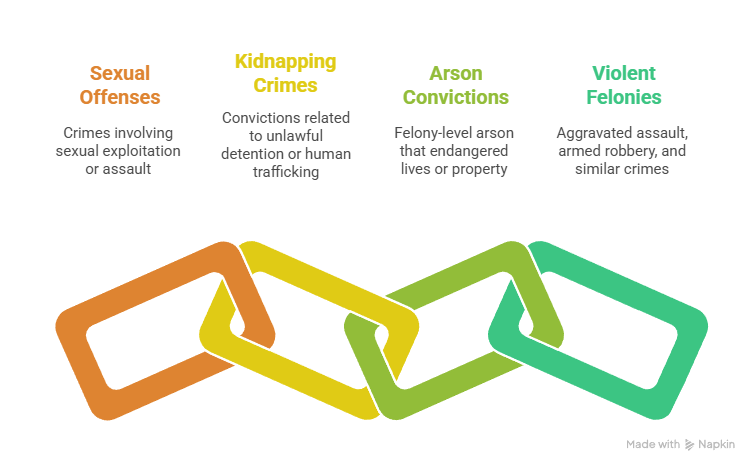Ohio daycare providers must complete comprehensive background checks through the Ohio Department of Job and Family Services (ODJFS) that include criminal history screenings, child abuse registry checks, and federal database reviews. These screenings are mandatory for all childcare facility owners, employees, and household members in family childcare settings, with specific requirements varying between Type A and Type B home providers.
Key Takeaways
- All Ohio childcare providers must pass ODJFS background checks before receiving licensing or certification to operate legally.
- Background screening requirements differ significantly between Type A family childcare homes and Type B facilities based on capacity and structure.
- Criminal history checks include state, federal, and local databases along with child abuse and neglect registry screenings across all states of residence.
- Disqualifying offenses include violent crimes, drug-related felonies, and any convictions involving harm to children or vulnerable adults.
- Background check validity periods range from 2-5 years depending on the type of screening and provider category.
- Renewal processes require updated screenings and documentation to maintain active childcare licensing status in Ohio.
Understanding Ohio Childcare Background Check Requirements
Ohio's childcare industry operates under strict regulatory oversight to ensure child safety and protection. The Ohio Department of Job and Family Services (ODJFS) mandates comprehensive background screening processes for anyone involved in providing childcare services throughout the state. These requirements apply to all childcare facilities, family daycare homes, and in-home care providers who serve families beyond their immediate relatives.
The Ohio daycare background check requirements encompass multiple components designed to identify potential risks to children's wellbeing. State regulations require criminal history checks, child abuse registry screenings, and reference verifications for all applicants. Additionally, ODJFS coordinates with federal agencies to ensure comprehensive vetting through national databases and sex offender registries.
Background screening processes vary significantly based on the type of childcare operation and the individual's role within the facility. Ohio distinguishes between different provider categories, each with specific screening requirements and renewal timelines. Understanding these distinctions helps childcare providers navigate the licensing process efficiently while maintaining compliance with state regulations.
Types of Ohio Childcare Providers and Screening Differences
Type A Family Childcare Homes
Type A family childcare homes serve up to six children in a residential setting and face streamlined background check requirements. These providers must complete basic criminal history screenings and child abuse registry checks for the primary caregiver and any adult household members. The Ohio childcare background screening process for Type A homes typically takes 4-6 weeks to complete once all documentation is submitted.
Required screenings for Type A providers include state criminal history checks through the Ohio Bureau of Criminal Investigation (BCI), child abuse registry verification in Ohio and all previous states of residence, sex offender registry reviews for all adult household members, and three professional or personal references unrelated to the applicant. However, Type A providers benefit from expedited processing and lower fees compared to larger childcare facilities.
Type B Childcare Facilities
Type B facilities include larger family childcare homes serving 7-12 children and all commercial daycare centers regardless of capacity. These operations face comprehensive background screening requirements that mirror those applied to institutional childcare settings. The odjfs background check daycare process for Type B providers involves multiple screening components and typically requires 6-10 weeks for completion.
Enhanced screening requirements for Type B facilities include mandatory federal FBI checks for all staff members, multi-state registry verification across all 50 states, five professional references instead of three, and annual verification requirements rather than self-reported updates. Moreover, Type B facilities must also implement ongoing monitoring systems to track any changes in employee criminal history or child abuse registry status.
Required Background Check Components
Criminal history screenings form the foundation of Ohio's childcare background check system. Ohio requires comprehensive criminal history checks that examine local, state, and federal databases for all childcare providers and employees. The Ohio daycare licensing background check process includes Bureau of Criminal Investigation (BCI) screenings for Ohio residents and similar state-level checks for applicants from other states.

- State-level checks: Ohio BCI screening for all applicants regardless of residency
- Federal screening: FBI fingerprint-based checks required for Type B facilities
- Local records: County and municipal court records review
- Multi-jurisdictional: Previous states of residence criminal history verification
- Ongoing monitoring: Annual updates and self-reporting requirements
Federal Bureau of Investigation (FBI) fingerprint-based screenings are mandatory for Type B facilities and optional for Type A family providers. Criminal history reviews examine both conviction records and pending criminal cases that could impact childcare eligibility.
Child abuse registry checks identify individuals who have been substantiated for child maltreatment, even if criminal charges were not filed. All childcare providers must clear child abuse and neglect registry screenings in Ohio and every state where they have resided as adults. These checks require applicants to provide complete residential histories and authorize searches in multiple states.
Ohio maintains a centralized child abuse registry that tracks substantiated cases of child maltreatment, including physical abuse, sexual abuse, neglect, and emotional maltreatment. Registry checks also examine adult protective services records for cases involving vulnerable adults or elderly individuals. Furthermore, any substantiated finding typically results in automatic disqualification from childcare employment or licensing.
Application and Documentation Process
The Ohio daycare background check requirements include extensive documentation and application procedures that vary by provider type and individual circumstances. Applicants must complete detailed personal history forms, provide fingerprints for criminal screening, and submit supporting documentation for verification purposes. The application process requires careful attention to accuracy and completeness to avoid delays or rejections.
ODJFS provides online application portals for most background check components, streamlining the submission process while maintaining security protocols. However, certain elements such as fingerprinting and notarized documents require in-person completion at designated locations throughout Ohio. Consequently, applicants should plan for multiple appointments and potential travel to complete all required elements.
| Document Type | Purpose |
| Application Form JFS-01234 | Personal and employment history |
| Fingerprint Cards (FD-258) | Criminal background screening |
| Photo Identification | Identity verification |
| Residential History | Multi-state registry checks |
| Employment References | Character verification |
Processing times vary based on the complexity of the applicant's background and the current volume of applications. Therefore, applicants can check status updates through the ODJFS online portal using their reference numbers.
Timeline and Validity Periods
Ohio childcare background check processing follows predictable timelines that depend on the scope of screening required and the applicant's residential history. Initial applications typically begin processing within 5-7 business days of receipt, with criminal history checks completing first followed by registry screenings and reference verification. The odjfs background check daycare system provides regular status updates throughout the process.
Most Ohio childcare background screening processes complete within the standard timeframes outlined by ODJFS regulations. However, certain circumstances can extend processing times significantly, including incomplete applications, discrepancies in personal information, or the need for additional documentation. As a result, applicants should submit materials well in advance of desired start dates to accommodate potential delays.
Standard processing follows a structured timeline: Week 1-2 involves application review and initial criminal history screening, Week 3-4 includes multi-state registry checks and reference verification, and Week 5-6 focuses on final review and determination letter issuance. Extended cases may require up to 12 weeks for complex backgrounds or multi-state histories.
Background check validity periods vary by component and provider type, with most screenings remaining valid for 2-5 years from the completion date. Criminal history checks typically maintain validity for 5 years, while child abuse registry screenings require renewal every 2 years for active childcare providers. Understanding these timelines helps providers plan for renewal processes and maintain continuous compliance.
Costs and Fees Structure
The financial investment for Ohio daycare background check requirements varies based on provider type and the scope of screening needed. ODJFS sets standard fees for most background check components, though additional costs may apply for multi-state registry checks or expedited processing requests. Understanding the complete fee structure helps childcare providers budget appropriately for initial licensing and renewal processes.
Current ODJFS background check fees include several components that providers must consider when budgeting for compliance. Ohio Criminal History (BCI) screening costs $22 for both Type A and Type B providers, while FBI Federal Screening requires an $18 fee. Child abuse registry checks cost $15 per state for both provider types, and administrative processing fees range from $25 for Type A providers to $45 for Type B facilities.
Additional fees may apply for fingerprinting services, which are typically provided by local law enforcement agencies or private screening companies. These costs range from $10-30 depending on the location and service provider. Some agencies offer package deals for childcare providers requiring multiple background checks for staff members or family household members.
Payment methods include online credit card processing, money orders, and certified checks made payable to ODJFS. Personal checks are not accepted for background check fees, and all payments must be received before processing begins. Additionally, refunds are not provided for applications that result in disqualification or withdrawal.
Common Disqualifications and Appeal Process
Ohio maintains strict disqualification criteria designed to protect children from individuals who may pose safety risks. Certain offenses result in automatic permanent disqualification, while others may be eligible for waiver consideration based on rehabilitation evidence and time elapsed since conviction. Understanding these criteria helps potential childcare providers assess their eligibility before investing time and money in the application process.
Permanent disqualification offenses include the most serious crimes that pose direct threats to child safety. Murder or manslaughter convictions result in lifetime bans regardless of timeframe or circumstances. Child abuse or neglect findings, whether through substantiated reports or criminal convictions, also result in permanent disqualification from childcare work.

- Sexual offenses: Rape, sexual assault, or crimes involving sexual exploitation create permanent barriers to childcare employment.
- Kidnapping crimes: Convictions related to unlawful detention or human trafficking result in automatic disqualification.
- Arson convictions: Felony-level arson that endangered lives or property permanently bars childcare involvement.
- Violent felonies: Aggravated assault, armed robbery, and similar crimes create lasting disqualification.
However, some offenses may qualify for waiver consideration under specific circumstances. The appeal process allows applicants to request reconsideration of negative determinations through formal administrative procedures.
The waiver application process requires extensive documentation including character references, employment history, education records, and evidence of community involvement or rehabilitation programs. Potential waiver eligibility applies to non-violent felonies such as property crimes or drug possession offenses over 10 years old, misdemeanor convictions with evidence of rehabilitation and stable employment, youthful offenses committed as juveniles with subsequent clean records, and procedural dismissals where charges were dismissed due to procedural issues rather than merit. Legal representation is advisable for complex cases or serious offenses that may qualify for waiver consideration.
Maintaining Compliance and Ongoing Requirements
Ohio childcare providers must maintain ongoing compliance with background check requirements throughout their licensing periods. This includes reporting any changes in criminal history, new arrests, or child protective services investigations involving the provider or staff members. Failure to report changes can result in license suspension or revocation, regardless of the ultimate outcome of legal proceedings.
Ongoing compliance requirements encompass several critical responsibilities that providers must manage consistently. Immediate reporting becomes necessary when arrests, charges, or investigations involve the provider or staff members. Annual updates require verification of continued eligibility and current contact information to maintain active licensing status.
- Renewal applications: Timely submission before current clearances expire
- Staff changes: New background checks for all additional employees or household members
- Record maintenance: Documentation of all compliance activities and renewal dates
- Audit cooperation: Full participation in ODJFS compliance reviews and inspections
ODJFS conducts random compliance audits and responds to complaints regarding childcare providers who may no longer meet background check requirements. These investigations can result in surprise inspections, staff interviews, and reviews of employment records to ensure ongoing compliance with safety standards. Providers should maintain detailed records of all background check documentation, renewal dates, and staff changes to demonstrate compliance during inspections.
Special Circumstances and Exceptions
Ohio law provides limited exceptions to standard background check requirements in specific circumstances. Emergency childcare situations may qualify for temporary provisional status while background checks are pending, but only under strict supervision and with ODJFS approval. Additionally, certain family members may receive expedited processing when caring for children in emergency placements or kinship care arrangements.
Out-of-state providers seeking Ohio licensure face additional requirements to ensure equivalent screening standards. These applicants must provide documentation of background checks completed in other states and may need supplemental screening to meet Ohio's specific requirements. The Ohio daycare background check requirements for interstate providers often include additional verification steps and extended processing timeframes.
Military families and federal employees may access expedited background check processing through specialized programs designed to accommodate frequent relocations. These programs streamline the verification process while maintaining the same safety standards applied to all childcare providers. However, military status does not exempt individuals from any screening requirements or disqualification criteria.
Technology and Electronic Processing
ODJFS has modernized the background check process through electronic submission systems and digital record management. The online portal system allows applicants to submit most documentation electronically, track application status, and receive notifications about processing milestones. This technology reduces processing times and improves accuracy by eliminating manual data entry errors.
Electronic fingerprinting systems at approved locations capture biometric data digitally and transmit results directly to state and federal databases. This process eliminates delays associated with mailed fingerprint cards and provides faster turnaround times for criminal history checks. The ODJFS background check daycare system integrates with national databases to provide real-time verification of criminal history and registry information.
Mobile-friendly interfaces allow childcare providers to access their background check information from smartphones and tablets. Push notifications alert users to important deadlines, renewal requirements, and status changes. Additionally, digital record storage provides secure access to historical background check information for compliance documentation and audit purposes.
Conclusion
Ohio's comprehensive childcare background check system reflects the state's commitment to protecting children through thorough vetting of all childcare providers and staff members. The ODJFS requirements encompass multiple screening components designed to identify potential risks while providing clear pathways for qualified individuals to enter the childcare profession. Understanding these requirements, timelines, and ongoing obligations helps providers navigate the regulatory landscape successfully. Whether operating a small Type A family childcare home or managing a large commercial facility, maintaining compliance with Ohio's background check requirements is essential for protecting both children and childcare businesses from potential liability and ensuring continued licensing eligibility.
Frequently Asked Questions
How long does an Ohio daycare background check take to complete?
Most Ohio daycare background checks take 4-6 weeks for Type A family providers and 6-10 weeks for Type B facilities, depending on the applicant's residential history and the scope of required screenings.
What disqualifies you from working at a daycare in Ohio?
Permanent disqualifications include murder, child abuse convictions, sexual offenses, kidnapping, and arson. Drug felonies, violent crimes, and theft may also disqualify applicants depending on timeframes and circumstances.
How much do Ohio daycare background checks cost?
Basic Ohio daycare background checks cost approximately $60-80 for Type A providers and $80-100 for Type B facilities, including BCI screening, registry checks, and administrative fees.
Do Ohio daycare background checks expire?
Yes, Ohio daycare background checks have validity periods ranging from 2-5 years depending on the component, with criminal history checks valid for 5 years and registry checks requiring renewal every 2 years.
Can you appeal a failed Ohio daycare background check?
Yes, applicants can appeal negative determinations through ODJFS administrative procedures, though success rates are limited, particularly for serious criminal convictions or child abuse findings.
Do household members need background checks for Ohio family daycare?
Yes, all adult household members in Type A family childcare homes must complete background checks including criminal history and child abuse registry screenings before the provider can receive licensing.
Additional Resources
- Ohio Department of Job and Family Services - Childcare Licensing Division
https://jfs.ohio.gov/cdc/licensing.stm - Ohio Bureau of Criminal Investigation Background Check Services
https://www.ohioattorneygeneral.gov/Business/Services-for-Business/BCI - National Child Care Information and Technical Assistance Center
https://childcareta.acf.hhs.gov/ - Ohio Child Care Resource and Referral Association
https://www.occrra.org/ - Child Care Law Center - State Licensing Requirements
https://www.childcarelaw.org/ - Ohio Administrative Code - Childcare Licensing Rules
https://codes.ohio.gov/ohio-administrative-code/rule-5101:2-12
Still have questions?
Get in touch with our team today for a personalized demo and discover how our tailored volume pricing and packages can drive results for your business!
How useful was this page?*
Note: your comments are anonymous. We use them to improve the website. Do not include any personal details.
Visit our FCRA Compliance Tool or leave a message here if you need a response.
From the blog Explore the GCheck Content Hub

DOT Physical Requirements for Drivers: 2026 Compliance Guide
9 Jan, 2026 • 17 min read
Healthcare Employee Background Check: What Employers Need to Know in 2026
9 Jan, 2026 • 19 min read
How Long Do Background Checks Take for Government Jobs? Timeline Expectations for 2026
6 Jan, 2026 • 20 min readThe information provided in this article is for general informational and educational purposes only and should not be construed as legal advice or a substitute for consultation with qualified legal counsel. While we strive to ensure accuracy, employment screening laws and regulations—including but not limited to the Fair Credit Reporting Act (FCRA), Equal Employment Opportunity Commission (EEOC) guidelines, state and local ban-the-box laws, industry-specific requirements, and other applicable federal, state, and local statutes—are subject to frequent changes, varying interpretations, and jurisdiction-specific applications that may affect their implementation in your organization. Employers and screening decision-makers are solely responsible for ensuring their background check policies, procedures, and practices comply with all applicable laws and regulations relevant to their specific industry, location, and circumstances. We strongly recommend consulting with qualified employment law attorneys and compliance professionals before making hiring, tenant screening, or other decisions based on background check information.

